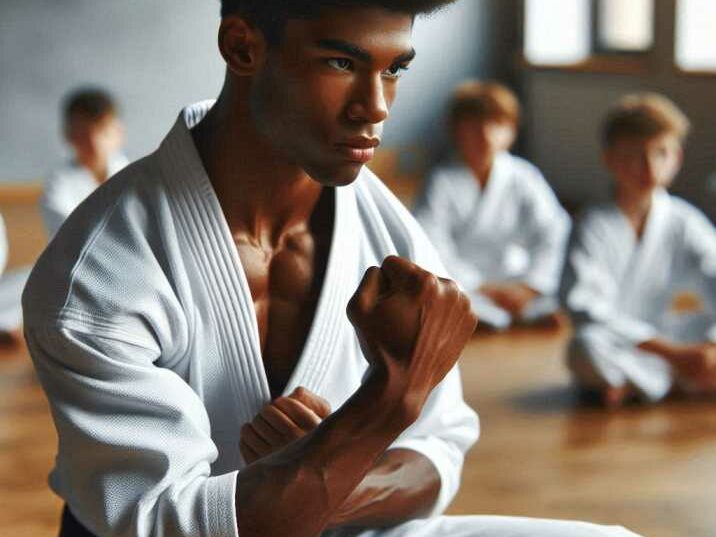Introduction:
Table of Contents
In today’s world, where bullying has become a pervasive issue, communities are actively seeking effective solutions to combat this harmful behavior. Martial arts instructors emerge as unsung heroes in this battle, wielding unique skills and insights to empower students and create safe spaces. This article delves into the vital role these instructors play in bullying prevention and how their guidance fosters resilience, confidence, and respect among students.

1. Understanding the Role of Martial Arts Instructors
Martial arts instructors are not just teachers of combat techniques; they are mentors, role models, and advocates for positive change. At the heart of their mission lies a commitment to instilling values such as discipline, respect, and self-control in their students. By nurturing these qualities, instructors empower children to navigate challenges, including bullying, with grace and confidence.
Teaching Self-Defense Techniques
One of the primary roles of martial arts instructors in bullying prevention is equipping students with essential self-defense techniques. Through structured training sessions, students learn how to defend themselves effectively without resorting to violence. These techniques not only serve as practical skills but also boost students’ self-assurance and assertiveness.
Fostering Confidence and Resilience
Bullying often thrives in environments where victims feel powerless and isolated. Martial arts instructors counteract this by nurturing confidence and resilience in their students. Through consistent practice and encouragement, instructors help children develop a strong sense of self-worth and the courage to assert their boundaries.
2. Creating a Culture of Respect and Inclusivity
Central to bullying prevention is the cultivation of a culture where respect and inclusivity are paramount. Martial arts dojos serve as microcosms of such cultures, where every student is valued and supported regardless of their background or abilities. Instructors actively promote empathy, kindness, and mutual respect among students, laying the groundwork for a bully-free environment.
Emphasizing Non-Violent Conflict Resolution
Martial arts philosophy emphasizes the principle of non-violence and conflict resolution. Instructors teach students that true strength lies not in physical dominance but in finding peaceful resolutions to conflicts. By imparting strategies for de-escalation and negotiation, instructors empower children to resolve conflicts without resorting to aggression.
Celebrating Diversity and Inclusion
In the dojo, diversity is celebrated as a strength rather than a division. Martial arts instructors foster an environment where students from diverse backgrounds come together in pursuit of a common goal. Through collaborative practice and mutual respect, students learn to appreciate and embrace differences, fostering a sense of belonging and community.
3. Empowering Students to Be Upstanders
Bystander intervention is a crucial aspect of bullying prevention, and martial arts instructors play a pivotal role in empowering students to become upstanders rather than bystanders. Through role-playing exercises and discussions, instructors teach students the importance of speaking up against injustice and standing in solidarity with those who are targeted.

Building Social and Emotional Skills
Bullying prevention goes beyond physical self-defense; it requires the development of strong social and emotional skills. Martial arts instructors incorporate activities and discussions that enhance students’ empathy, communication, and conflict resolution abilities. These skills enable students to intervene effectively in bullying situations and offer support to those in need.
Instilling a Sense of Responsibility
Instructors instill in their students a sense of responsibility towards themselves and their peers. By emphasizing the importance of integrity and compassion, instructors empower students to take proactive steps to prevent bullying within their communities. Whether through peer mentoring programs or leadership opportunities, students learn that they have the power to effect positive change.
4. Building Character and Leadership Skills
Martial arts training goes beyond physical techniques; it is also a journey of personal growth and character development. Instructors emphasize the importance of integrity, perseverance, and leadership, molding students into responsible individuals who lead by example. Through structured curriculum and mentorship, martial arts instructors cultivate qualities that empower students to become positive role models and advocates for change within their communities.
Cultivating Discipline and Focus
Discipline and focus are fundamental principles in martial arts practice. Instructors guide students through rigorous training routines that require dedication and concentration. By mastering these skills, students develop the mental fortitude to resist peer pressure and make informed decisions, reducing their vulnerability to bullying behavior.
Nurturing Empathy and Compassion
Empathy and compassion are essential qualities for fostering understanding and connection among individuals. Martial arts instructors incorporate lessons on empathy and compassion into their teachings, encouraging students to consider the feelings and perspectives of others. By fostering empathy, instructors create an environment where students are more likely to intervene in bullying situations and offer support to those in need.
5. Strengthening Peer Relationships
Healthy peer relationships are a cornerstone of bullying prevention efforts. Martial arts classes provide a structured environment where children can form positive friendships and support networks. Instructors facilitate team-building activities and partner drills that encourage cooperation and mutual respect among students. These bonds not only enhance the overall experience of martial arts training but also create a sense of camaraderie that deters bullying behavior.
Promoting Collaboration and Sportsmanship
Martial arts training often involves partner work and group activities that require collaboration and sportsmanship. Instructors emphasize the importance of working together towards common goals and celebrating each other’s successes. By fostering a culture of mutual support and encouragement, instructors create an environment where bullying has no place, and students feel empowered to lift each other up rather than tear each other down.
Providing Mentorship and Guidance
Martial arts instructors serve as mentors and role models for their students, offering guidance both inside and outside the dojo. They provide a listening ear for students who may be experiencing bullying or other challenges and offer strategies for coping and seeking help. By building trusting relationships with their students, instructors create a safe space where students feel comfortable sharing their experiences and seeking assistance when needed.
Table of Information:
| Heading | Subheading |
|---|---|
| Understanding the Role of Martial Arts Instructors | Teaching Self-Defense Techniques |
| Fostering Confidence and Resilience | |
| Creating a Culture of Respect and Inclusivity | Emphasizing Non-Violent Conflict Resolution |
| Celebrating Diversity and Inclusion | |
| Empowering Students to Be Upstanders | Building Social and Emotional Skills |
| Instilling a Sense of Responsibility |
Conclusion:
In conclusion, martial arts instructors serve as powerful agents of change in the fight against bullying. Through their guidance, expertise, and unwavering commitment, they empower students to stand tall, speak out, and support one another. By fostering cultures of respect, inclusivity, and empathy, these instructors create ripple effects that extend far beyond the confines of the dojo, shaping a safer and more compassionate society.
FAQs (Frequently Asked Questions):
- Q: Can martial arts training really help prevent bullying?
- A: Yes, martial arts training equips students with self-defense skills, confidence, and resilience, making them less likely targets for bullies.
- Q: How do martial arts instructors promote inclusivity?
- A: Martial arts instructors celebrate diversity and create environments where every student feels valued and supported, regardless of differences.
- Q: What should a child do if they witness bullying?
- A: Martial arts instructors teach children to be upstanders by speaking up against bullying and offering support to the victim.
- Q: How can martial arts training benefit a child’s overall well-being?
- A: Martial arts training improves physical fitness, mental discipline, and emotional resilience, leading to enhanced overall well-being.
- Q: Are martial arts suitable for children of all ages and abilities?
- A: Yes, martial arts classes are typically tailored to accommodate children of various ages and abilities, fostering an inclusive learning environment.


